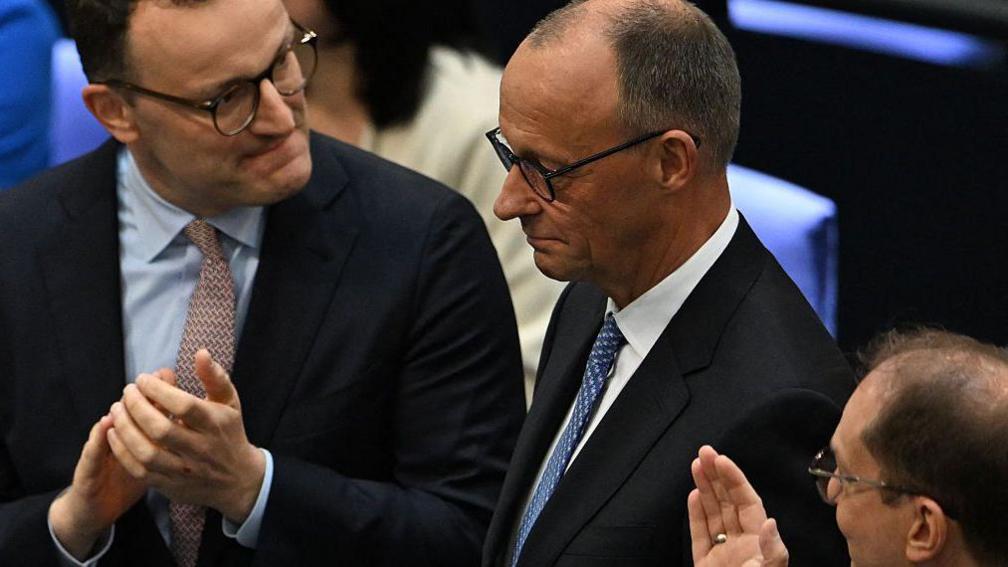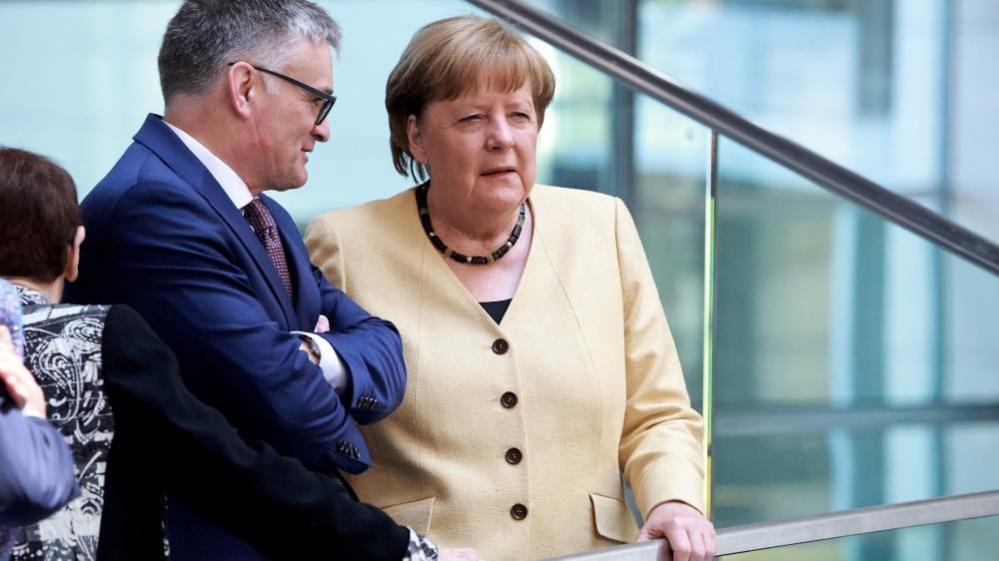Germany's Merz becomes chancellor after surviving historic vote failure

A second vote was agreed on Tuesday afternoon, hours after Merz's initial defeat
- Published
Conservative leader Friedrich Merz has won a parliament vote to become Germany's next chancellor at the second attempt.
Merz had initially fallen six votes short of the absolute majority he needed on Tuesday morning - a significant blow to his prestige and an unprecedented failure in post-war German history.
As it was a secret ballot in the 630-seat Bundestag, there was no indication who had refused to back him - whether MPs from his centre-left coalition partner or his own conservatives.
After hours of uncertainty in the Bundestag, the parties and the president of the Bundestag agreed to hold a second vote, which Merz then won with 325 votes, a majority of nine.
His coalition with the Social Democrats should have had enough seats in parliament from the start, with 328 MPs in total, but it is thought 18 of them dissented during the first vote.
No chancellor candidate has lost a Bundestag vote in the 76 years since democracy was restored in Germany in 1949, and there was a prevailing mood of confusion in parliament in the hours after the vote.
Under Germany's constitution, there is no limit to how many votes can be held but in practice another defeat for Merz would have meant a headache for his Christian Democrats, its sister party the Christian Social Union and their partner the Social Democrats.
The result meant a total debacle had been averted, declared one German news website.
Merz, 69, was then sworn in as chancellor by President Frank-Walter Steinmeier, and his team of 17 ministers were due to take office.
Bundestag President Julia Klöckner had originally been planning a follow-up vote on Wednesday, but Christian Democrat General Secretary Carsten Linnemann said it was important to press ahead.
"Europe needs a strong Germany, that's why we can't wait for days," he told German TV.
Parliamentary group leader Jens Spahn appealed to his colleagues' sense of responsibility: "All of Europe, perhaps the whole world, is watching this ballot."
Merz's defeat had been seen by political commentators as a humiliation, possibly inflicted by a handful of disaffected members of the Social Democrat SPD, which signed a coalition deal with his conservatives on Monday.
The Bundestag president told MPs that nine of the 630 MPs had been absent for the first vote while three had abstained and another ballot paper had been declared invalid.
Germany's new Europe Minister, Gunther Krichbaum, told the BBC that some MPs may have hoped for a ministerial or state secretary role and had their hopes dashed. He also pointed out that some young Social Democrats had publicly said they were not convinced by Merz.
Conservative colleague Johann Wadephul: "I'm sure [Merz] will be the next chancellor"
However, SPD officials were adamant their party was fully committed to the coalition deal.
"It was a secret vote so nobody knows," senior Social Democrat MP Ralf Stegner told the BBC, "but I can tell you I don't have the slightest impression that our parliamentary group wouldn't have known our responsibility."
Krichbaum, a conservative, said the clear message was that "now we are today in the situation to create a stable government" to tackle Germany's big issues, including migration and the economy.
Far-right party Alternative for Germany, which came second in the February election with 20.8% of the vote, seized on Merz's initial failure and called for fresh elections.
Joint leader Alice Weidel wrote on X that the vote showed "the weak foundation on which the small coalition has been built between the [conservatives] and SPD, which was rejected by voters".
Merz's choice for foreign minister, Christian Democrat colleague Johann Wadephul, told the BBC the initial vote was "an obstacle but not a catastrophe".
Germany's handover of government is carefully choreographed. On the eve of Tuesday's vote, outgoing chancellor Olaf Scholz was treated to a traditional Grand Tattoo by an armed forces orchestra.
Merz had then been expected to sail through the initial vote on Tuesday morning, fulfilling a long-held ambition to become German chancellor.
His rival and former chancellor Angela Merkel had come to the Bundestag to watch the vote take place. She was not present for the second vote.

Former chancellor Angela Merkel had come to the Bundestag to see the vote
Among the first international leaders to congratulate Germany's conservative leader was Ukraine's Volodymyr Zelensky, who hoped that Germany would "grow even stronger and that we'll see more German leadership in European and transatlantic affairs".
Political correspondents in the Bundestag said Merz's initial shock result indicated he had a potential problem lurking within his coalition ranks.
AfD MP Bernd Baumann said the CDU had promised a string of policies similar to his own party's, such as limiting migration, and had then gone into an alliance with the centre left: "That doesn't work. That's not how democracy works."
"This isn't good," warned Green politician Katrin Göring-Eckardt. "Even though I don't want this chancellor or support him, I can only warn everyone not to rejoice in chaos."
Barely 24 hours earlier, the messaging from Merz had been very different, of a new, stable government bringing six months of political paralysis to an end.
"It's our historical duty to make this government a success," he had said as he signed the coalition document on Monday.
Despite having a narrow majority of 12 seats, the agreement between the conservatives and centre left was seen as far more secure than the so-called traffic-light coalition of three parties that fell apart last November in a row over debt spending.
The SPD, which had been the biggest party in the old coalition slumped to its worst post-war election result in third place, but Merz had promised that Germany was back and that he would boost its voice on the world stage and revive a flagging economy.
After two years of recession, Europe's largest economy grew in the first three months of 2025. However economists have warned of potential risks to German exports because of US-imposed tariffs.
Germany's services sector contracted last month because of weaker demand and lower consumer spending.